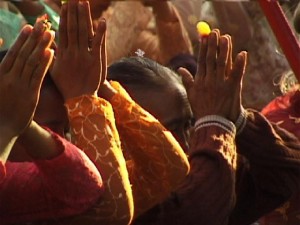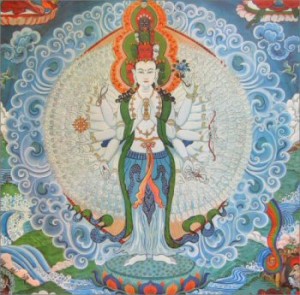
An excerpt from a teaching by Jetsunma Ahkon Lhamo from the Vow of Love series
All of our suffering is brought about because we have desire in our mindstreams. Having desire, we have attachment and aversion, hope and fear. Examine your own thoughts. Every one of them is either a thought of hope or a thought of fear. There isn’t one that doesn’t have as an underlying cause of hope or fear, attraction or aversion. Every one. That is the way the mind of duality works. So all of the experiences that we have, according to the Buddha, are caused by the karma of desire. Making wishing prayers to return in a form in which you can benefit beings purifies the mind of desire. You will find that desire rules your mind less and less. Compassion is the great stabilizer of the mind.
Never stop cultivating aspirational Bodhicitta. While you are practicing aspirational Bodhicitta your mind becomes firm and stabilized. You are so on fire that you need to practice, in the same way that because you are determined to live, you always remember to breathe. With that intensity, you should be absolutely determined to accomplish compassion and benefit all beings. You always remember to practice and be mindful. Then you begin to practice practical Bodhicitta.
Practical Bodhicitta has two divisions. It has a lesser and greater division, or personal and a transpersonal division. Compassion on the personal level is what we call ordinary human kindness. It is invaluable. There is never a time in your life that you should not practice ordinary human kindness. I am sometimes dismayed at people who have a high-fallutin’ idea about compassion and how to practice the Vajrayana path, and they know how to do the proper instrumentation and they can chant and they can do all these wonderful things. But they aren’t kind to one another. How you can think of yourself as a real practitioner and not even be nice to the person next to you? How can you be arrogant?
Ordinary human kindness must be constantly practiced. If you know of someone who is hungry, you should do your best to feed them. If a starving child were in front of you, wouldn’t you feed him or her? If someone that you loved really was lonely, wouldn’t you try to help them? Of course, these are ordinary human kindnesses. We’re not even perfect in that, are we? I mean, we let ourselves and our families down. We let everybody down on a regular basis. Sometimes ordinary human kindness is impossible to achieve.
Ordinary human kindness is not lesser in its fabric or nature, but it touches less people. For instance, let’s say you needed a friend. If I were to stay with you for some period of time, we would talk and we would share. Maybe I would teach you to meditate, if I were to discover that you’re the kind of person that would really respond to that. But if I don’t do that, maybe I’ll have the time to teach a large group of people. Essentially I might be able to benefit many people as opposed to benefiting one person, even though you are very important and precious to me. Yet even teaching a larger group of people is actually an intermediate level of practice. There are only so many people that can fit in this room and can be taught.
What is the highest level of compassion? What is the highest level of Bodhicitta? You have to go back to the Buddha’s teaching to figure this one out. The Buddha says that all sentient beings are suffering and that there is an end to suffering and that the end to suffering is enlightenment. That’s the only true end to suffering. If you fed every one that’s hungry everyday and provided them each with a companion so that they’re never lonely, gave them nice clothes, they still will experience old age, sickness and death. There’s nothing you can do about that. And you have no control over how they will be reborn in their next incarnation. They could come back in a form in which they still suffer. The only end to suffering is to eradicate the cause of suffering from the mindstream.
The root cause of all suffering is the belief in self-nature as being inherently real. It’s the mother of all-pervasive desire in the mindstream. The children are hatred, greed and ignorance. The mind of duality causes us to act in certain ways that create the karma so that our lives manifest in certain ways. If we suffer from hunger or old age or sickness or death, whatever it is that we suffer from, the root cause for those sufferings is the belief that self-nature is inherently real. How can you possibly uproot all of that from your mindstream? How can you rid the very seed of suffering from your mindstream? According to the Buddha, that is to achieve enlightenment. To help sentient beings remove these causes from their mindstreams, we must ourselves first achieve enlightenment. The purpose of self, which is to achieve enlightenment, is the same as the purpose of other, which is to achieve enlightenment. They are the same, in the same way that we are non-dual, these purposes are non-dual.
© Jetsunma Ahkön Lhamo

![bodhisattvas[1]](https://www.tibetanbuddhistaltar.org/wp-content/uploads/2010/08/bodhisattvas1.jpg)


